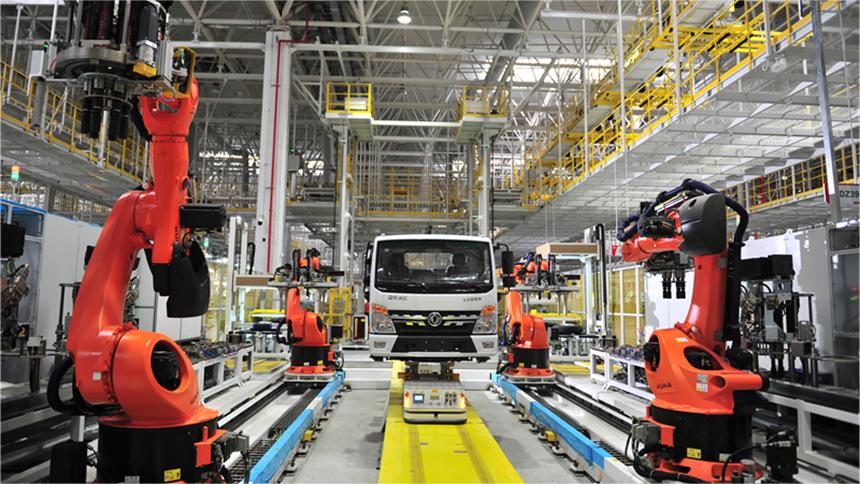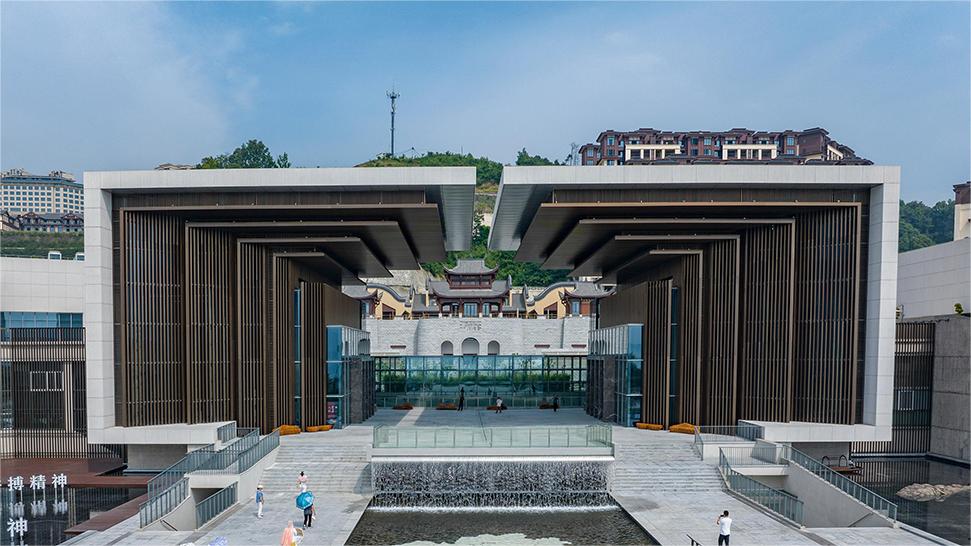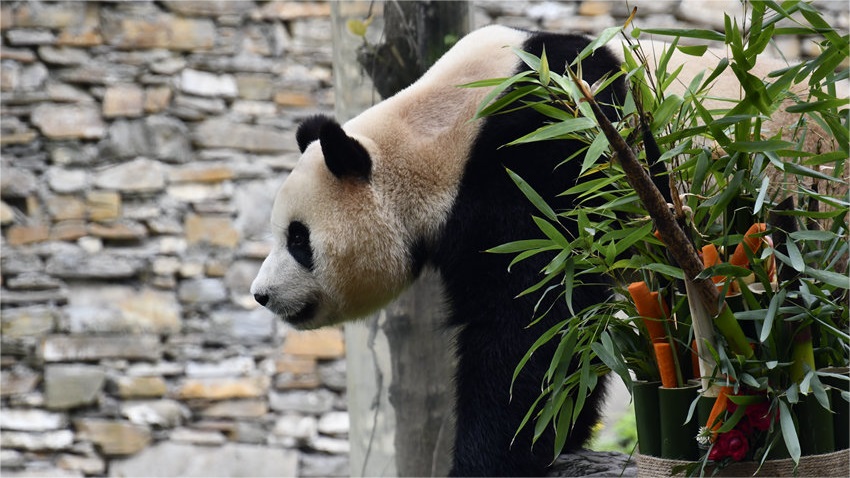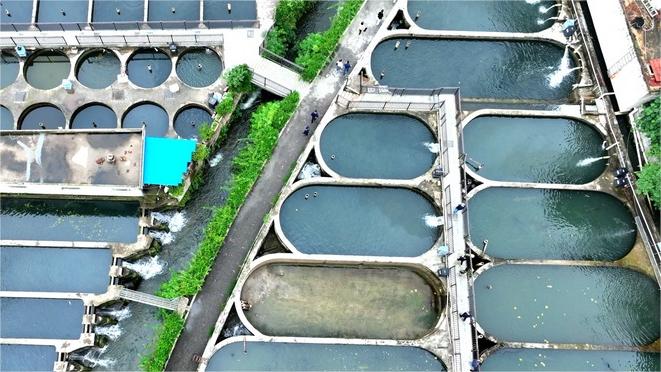Eye in sky nets big fame for village

A JOUAV staff member conducts flight tests at the "Sky Eye" Unmanned Aerial Vehicle flight test base in Pengzhou, Sichuan province. CHINA DAILY
If you visit the Luping community deep in the Longmen Mountains on the northern edge of the Chengdu Plain, you will be amazed to see all kinds of drones flying as if they were in the midst of an aerial combat movie.
The mountain village, little known until recently, has become a hot destination for drone research and development, testing, and application companies from all over the country, thanks to an innovative program launched by a local entrepreneur seven years ago.
Located about 70 kilometers from the urban area of Chengdu, capital of Southwest China's Sichuan province, the Luping community in Guihua town, Pengzhou, is home to the "Sky Eye" Unmanned Aerial Vehicle flight test base.
Zhou Xiaoming, born and raised in Luping, is the founder of the base and one of the pioneers of the UAV flight test business in Chengdu.
"I've always dreamt of aviation as a child. While helping my parents with farm labor on the mountaintop, I used to look into the distance at the sparkling lights of Chengdu's urban area, hoping to one day fly out of the mountain village and achieve something," the 39-year-old recalled.
After graduating from university in 2007, Zhou entered the general aviation industry. While there, he realized the advantages and market potential of UAVs, which are increasingly being used in crop protection, mapping, and inspection. In 2015, Zhou joined a UAV company as a flight test mechanic.
Inspired by the huge development potential of the low-altitude industry, Zhou quit the job in June 2017, sold his apartment in Chengdu, and returned to Pengzhou to start his own business.
"Despite the rapid development and wide applications of drones, the lack of flight test sites remained a major problem," Zhou said.
He said drone companies typically chose to conduct flight tests at general aviation airports, but the flight approval process was complicated and expensive. This gave him the idea of establishing a flight test base specifically for drones.
"I thought of my hometown, which faces the Jianjiang river valley and has a complex terrain that is suitable for flight tests, with no military or civilian aircraft flight paths overhead and the nearest airports over 50 kilometers away," Zhou said.
After returning to Pengzhou, he found the local government also vigorously promoting the development of the drone industry. For professional and standardized management and operation, he cooperated with a State-owned company in Pengzhou to jointly build the "Sky Eye" UAV flight test base.
In December 2017, Sichuan was approved as the first province to conduct a pilot program for low-altitude airspace. Thanks to that, the base has obtained a flight test airspace within an altitude of 1,200 meters and a radius of 5 km. It currently operates eight flight test sites at different altitudes and offers 14 test scenarios.
Zhou said the pilot program has simplified the approval process for drone flights from seven working days of prior approval to a one-hour prior report before takeoff.
"Drone companies coming to the base for flight tests do not need to go through the process of reporting to various departments themselves. They simply need to send their daily flight plans to the base, which will then report to the air traffic control department on their behalf," he said.
Zheng Wenqiang, who is in charge of the flight test tasks at the base for his company JOUAV, said they used to conduct flight tests at general aviation airports, but UAVs were given lower priority than manned aircraft there, making it quite difficult to guarantee stable and sufficient flight time for their drones.
"At 'Sky Eye', our drones can conduct normalized flight tests. We are currently conducting flight tests for several models of drone products here," he said.
Zheng said JOUAV has been conducting flight tests at the base since July 2019, with the number of flights reaching about 1,500 per year.
"The flight test sites at the base are scattered across various terrains such as mountains, hills, rivers, lakes, flatlands, and forests, which can simulate various actual application scenarios of industrial drones," he said.
The "Sky Eye" gained more attention and favor from UAV companies after it was designated as a State-level civil UAV experimental base in 2022 by the Civil Aviation Administration of China.
Now, more than 90 companies and institutions involved in UAV R&D, production, and training conduct flight tests at the "Sky Eye", with the daily flight volume exceeding 100. The base's revenue has seen an annual growth of more than 100 percent in the past three years, Zhou said.
Leveraging the abundant drone resources, the base is striving to establish a complete drone industry chain with a variety of new business models, including drone delivery, drone pilot training, model aircraft competition, and drone study tours.
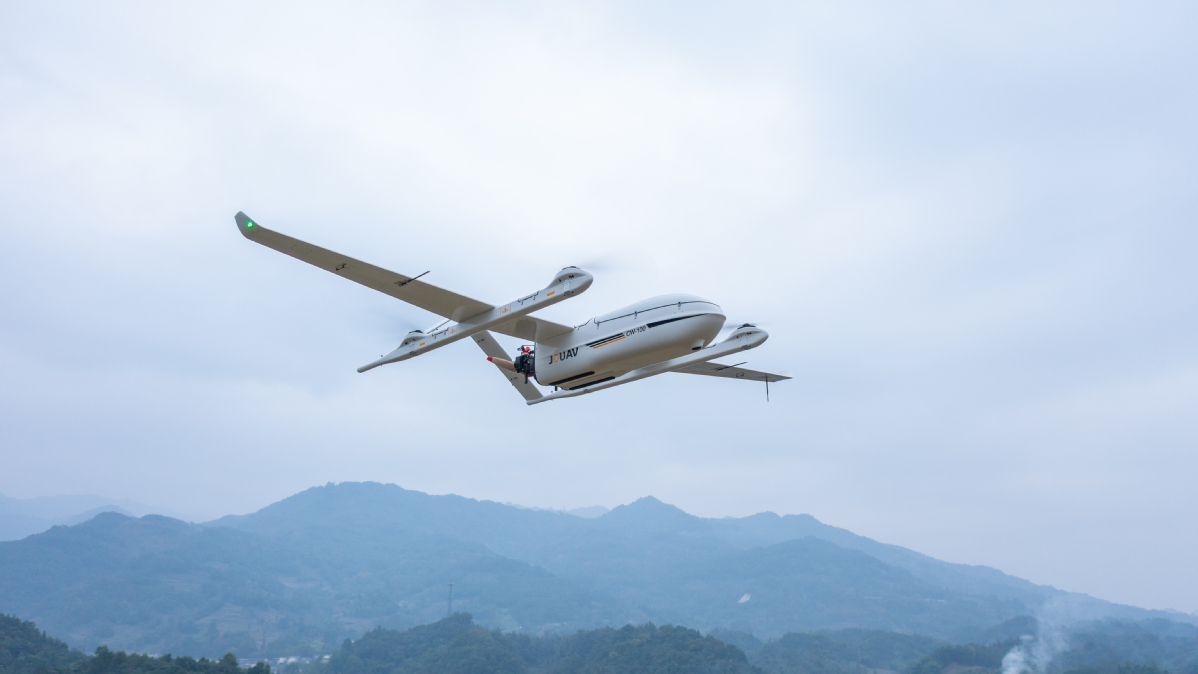
A JOUAV drone takes a test flight. CHINA DAILY
The drone delivery service, launched during this year's Spring Festival holiday, covers five homestays and campsites in the towns of Tongji, Bailu, and Danjingshan in Pengzhou, Zhou said.
"The trial operation has proved to be successful. There are so many orders that my colleagues and I have to give up our vacations to maintain the drones and ensure the normal operation of the flight routes," he said.
In the past few months, the drone delivery service has expanded to some 50 routes to cover the "Baili Gallery" eco-tourism area in Pengzhou, which is about 60 km long and covers an area of over 100 square km.
In April, China's first public service platform for drone airworthiness, Jianjiang Laboratory, was established at the base. The laboratory will focus on drone airworthiness capacity building, standard system exploration, scientific research, talent cultivation, and transfer and transformation of intellectual achievements.
Lu Min, director of Pengzhou's economic, technology, and information bureau, said the city will help the base develop into a center for training and examination, exhibition and sales, flight test and management, and operations of UAVs.
The city also plans to build the country's first 4S store for UAVs and one of the most influential UAV flight schools at the base, he said.
"We will conduct pilot trials in the Jianjiang river valley scenic area to explore the commercial operation models of new technologies including eVTOL (electric vertical takeoff and landing) aircraft, to expand the market and promote the development of the low-altitude economy," Lu added.
Zhou said construction of the 4S store for UAVs is scheduled to be completed in the latter half of this year.
"Customers to the 4S store can not only buy a wide range of drones with complete functions at reasonable prices, but also enjoy a one-stop 'buy and test' service," he said.
Zhou is also planning to develop a drone performance competition. He believes this will promote the iteration and upgrade of drone technology while bringing exciting drone performance to the public.
Photos
Related Stories
- Chinese cities speed up low-altitude economy, a new force driving development
- Int'l digital nomads embrace countryside life in China
- China’s grassroots soccer league Cunchao kicks up a storm
- First national 'Class Super League' friendly match kicks off in Guizhou
- Ancient village in E China's Jiangxi embraces new vitality
Copyright © 2024 People's Daily Online. All Rights Reserved.






